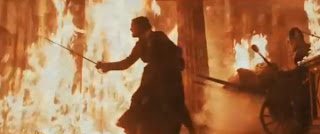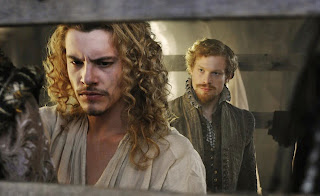My comment on this literary scholar's blog after the jump.
Tuesday, October 25, 2011
Comment-upon-comment: The scholars consider
On the Facebook ShakesVere boards, Geoffrey Green points to a recent blog post by a Stratfordian scholar who sighs and says, OK, Anonymous now means we have to take on the Oxfordians.
Tuesday, October 18, 2011
Sunday, October 09, 2011
The Soul of the Age, The Amadeus of the Stage: A review of the movie ANONYMOUS
In brief: See this movie. Anonymous is, first and foremost, a ripping good yarn. It also represents the biggest media event in the history of the Oxfordian story and perhaps the whole Shakespeare authorship question. Over the coming months and years, millions of people around the world who know nothing about Edward de Vere and his relationship to the "Shakespeare" canon will be witnessing the entire Elizabethan and Oxfordian world that Anonymous has fascinatingly and carefully created -- historical liberties and all. Some critics will undoubtedly knock Anonymous's departures from documented fact, even setting the Shakespeare authorship issue aside. But such criticism, in this reviewer's opinion, misses the point of the fictionalizing: The dramatic license the movie wields all arguably helps it tell a powerful and gripping story to as wide a global audience of moviegoers as possible. This is, on balance, a very good thing.
Review: Roland Emmerich's forthcoming Oxfordian biopic Anonymous (Columbia Pictures, US & UK release Oct. 28, elsewhere here) is a revolution in a 16:9 frame. Fittingly, the story prominently features its own uprising.
An enraged mob has just seen a performance of the Shakespeare play Richard III. Incited by the play's allegorical depiction of the crook-backed Elizabethan Machiavel Robert Cecil (Edward Hogg), they're ready to smash and burn. The playwright Ben Jonson (Sebastian Armesto) sees a trap, though, and he tries to stop the masses from running headlong into it.
Review: Roland Emmerich's forthcoming Oxfordian biopic Anonymous (Columbia Pictures, US & UK release Oct. 28, elsewhere here) is a revolution in a 16:9 frame. Fittingly, the story prominently features its own uprising.
However, as the "Essex Rebellion" actually played out 410 years ago, it was preceded by a performance of the Shakespeare play Richard II -- a knottier drama whose relationship to the rebellion turns on less immediately accessible points, concerning a scene depicting the deposition of an English monarch. And while we're nitpicking, Jonson wasn't part of the marauding hordes either.
Yet the success of Anonymous is that even those who know the historical facts with which the movie takes its liberties aren't given much time to care. It's a wild and entertaining ride. The intrigue and literary double-dealing sweeps the viewer up into a shadowy world all its own. The actor Shakespeare, as the film portrays him, is an ale-hoisting codpiece who fronts as the author of plays written behind the scenes by an Elizabethan court playwright who is no stranger to readers of this blog, Edward de Vere, 17th Earl of Oxford.
The depiction of de Vere blending into his Shakespearean milieu -- from authorship of plays and poems to courtly performances to outdoor public theaters -- is a revelatory and sometimes shocking experience. Even for an Oxfordian viewer.
Those who make a hobby or (part-time) profession professing the case for de Vere as "Shakespeare" nevertheless live in a hostile Stratfordian world, forever defending ourselves from critical brickbats. We rarely if ever get, even in our minds' eyes, to inhabit these worlds. But Anonymous exerts every effort to ensure that for two hours and ten minutes, we do. And, thanks to a painstaking work of filmmaking, we really do.
The immersion comes not just from the lavish production design and photorealistic and nearly ubiquitous CGI digital backdrops. (The computer generated imagery in fact fits so comfortably and seamlessly into the scenes and settings that it actually fooled Variety's reviewer into claiming Anonymous is "nearly CGI-free.")
Those who make a hobby or (part-time) profession professing the case for de Vere as "Shakespeare" nevertheless live in a hostile Stratfordian world, forever defending ourselves from critical brickbats. We rarely if ever get, even in our minds' eyes, to inhabit these worlds. But Anonymous exerts every effort to ensure that for two hours and ten minutes, we do. And, thanks to a painstaking work of filmmaking, we really do.
The immersion comes not just from the lavish production design and photorealistic and nearly ubiquitous CGI digital backdrops. (The computer generated imagery in fact fits so comfortably and seamlessly into the scenes and settings that it actually fooled Variety's reviewer into claiming Anonymous is "nearly CGI-free.")
A few performances -- in particular the mother-daughter team of Vanessa Redgrave and Joely Richardson as the elder and younger Queen Elizabeth -- entice the viewer like a siren to join the film's Oxfordian universe.
And Rhys Ifans's quiet and measured turn as the mature Edward de Vere reverses nearly a century of academic slander against his character by flashing the fire and shaking the spears that Oxfordians have long said makes him such a compelling and convincing "Shakespeare." Ironically, Ifans' knowing glances, each themselves concealing volumes, will probably reach more eyes than the whole output of books and articles in the long history of the authorship question.
And Rhys Ifans's quiet and measured turn as the mature Edward de Vere reverses nearly a century of academic slander against his character by flashing the fire and shaking the spears that Oxfordians have long said makes him such a compelling and convincing "Shakespeare." Ironically, Ifans' knowing glances, each themselves concealing volumes, will probably reach more eyes than the whole output of books and articles in the long history of the authorship question.
At a public Q&A with Emmerich recently, Columbia University professor James Shapiro (Contested Will) tried to smear Emmerich with insinuations of Nazism -- a vile slander that provided a case-in-point of the desperation and intellectual bankruptcy that marks most Stratfordian rearguard actions today.
Orthodox Shakespeare scholars -- those whose reputations and careers rely on Shakspere of Stratford claiming exclusive right to the "Shakespeare" canon -- have good reason to be worried. The comparable arrow in their quiver, Shakespeare in Love, is an empty vessel compared to the heady draught of thriller, romance and epic literary biography that Anonymous serves up.
That Anonymous surpasses Shakespeare in Love, incidentally, is actually no trivial statement from this reviewer. I am one Oxfordian who enjoyed Shakespeare in Love, especially for its own witty and carefully crafted depiction of the period. But Shakespeare in Love was -- like Stratfordian best-selling books Will in the World or 1599: A Year in the Life of Shakespeare -- entertaining ultimately only for its backdrops and bit players. None of these stitch jobs had a living, approachable, comprehensible, and fallible human soul at its core.
Anonymous, on the other hand, delivers just that. It makes the kind of immediate and visceral human connection to its protagonist that good movie performances can forge.
That Anonymous surpasses Shakespeare in Love, incidentally, is actually no trivial statement from this reviewer. I am one Oxfordian who enjoyed Shakespeare in Love, especially for its own witty and carefully crafted depiction of the period. But Shakespeare in Love was -- like Stratfordian best-selling books Will in the World or 1599: A Year in the Life of Shakespeare -- entertaining ultimately only for its backdrops and bit players. None of these stitch jobs had a living, approachable, comprehensible, and fallible human soul at its core.
Anonymous, on the other hand, delivers just that. It makes the kind of immediate and visceral human connection to its protagonist that good movie performances can forge.
Subscribe to:
Posts (Atom)
















